What Are The Different Fibreglass Pool Types?
As a homeowner, few things enhance your property more than a stylish and functional swimming pool. Among the various types available today, fibreglass pools are gaining popularity for their versatility, durability, and elegance. This blog post aims to guide you through the different types of fibreglass pools available, highlighting their unique benefits and how to choose the best one for your home. We'll explore various designs, factors to consider before making a decision, and essential maintenance tips. By the end of this read, you'll be well-equipped with the knowledge needed to make an informed choice that suits your lifestyle and enhances the charm of your backyard.
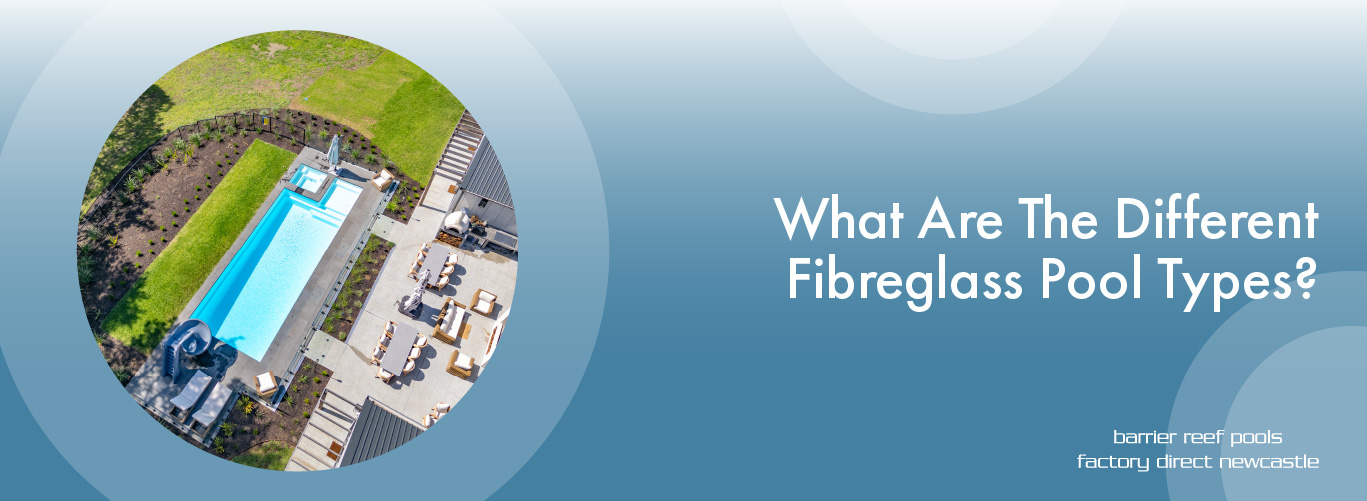
Benefits of Fibreglass Pools Over Traditional Pool Types
Durability and Longevity
One of the most significant advantages of fibreglass pools is their durability. Unlike concrete pools, which can crack over time due to ground movement, fibreglass pools are made from a flexible material that withstands such pressures. This resilience means fewer repairs and a longer lifespan, making them a cost-effective choice in the long run.
Quick Installation
Fibreglass pools come pre-manufactured, allowing for relatively quick installation compared to concrete pools, which need to be built on-site. What typically takes weeks or even months with traditional pools can often be completed in just a few days with fibreglass. This swift installation minimises disruption to your daily life and lets you enjoy your new pool sooner.
Low Maintenance
Maintaining a fibreglass pool is much more straightforward than other types. The smooth, non-porous surface of fibreglass inhibits algae growth, reducing the need for frequent cleaning and chemical treatments. As a result, you’ll spend less time maintaining your pool and more time enjoying it.
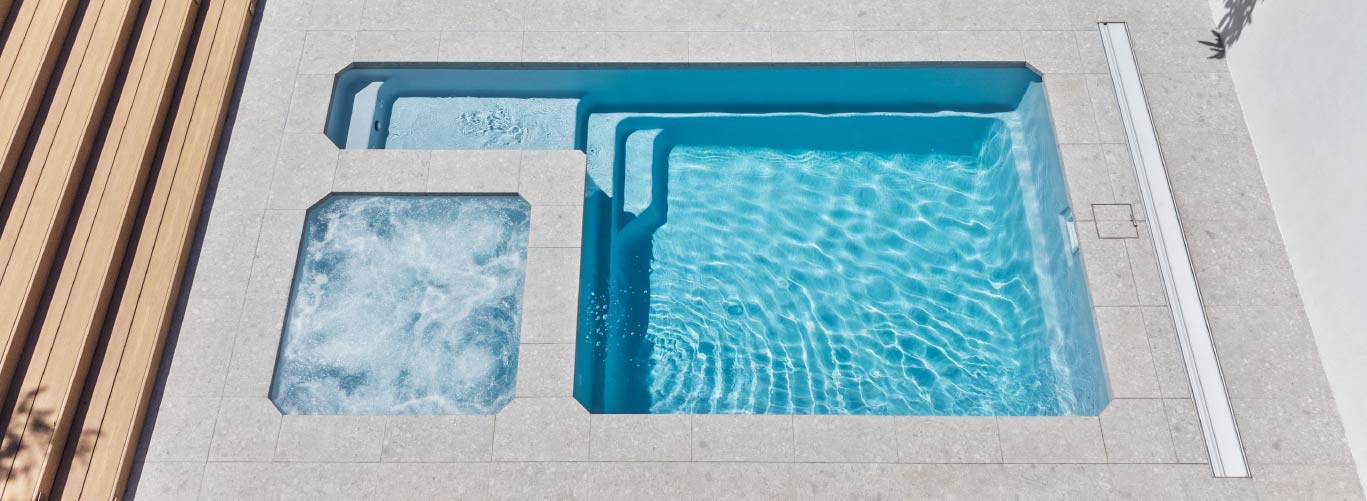
Overview of the Different Fibreglass Pool Designs
Rectangular Pools
Rectangular pools are a classic choice for those who prefer a traditional look. Their straight lines and clean edges make them ideal for swimming laps and hosting poolside gatherings. They also blend seamlessly with most landscape designs, offering a timeless appeal.
Freeform Pools
For a more natural aesthetic, freeform pools feature irregular shapes that mimic the appearance of a natural body of water. These pools are perfect for creating a backyard oasis, complete with rock formations, waterfalls, and lush landscaping. The organic shapes allow for creative freedom in design, providing a unique and customised look.
Plunge Pools
Plunge pools are compact and designed for relaxation rather than swimming laps. They are perfect for smaller backyards or as a complementary feature to a larger pool. Despite their size, plunge pools can be equipped with various features such as heating and jets, making them a luxurious retreat.
Lap Pools
Lap pools are long and narrow, specifically designed for exercise. They are ideal for fitness enthusiasts who want a pool for daily workouts. The streamlined design allows for efficient swimming, and they can be easily integrated into modern landscapes.
Pool and Spa Pools
A combination of a spa and a pool, pool and spa pools are smaller than traditional swimming pools but larger than typical spas. They offer the best of both worlds – a place to relax and unwind with the added benefit of a swimming area. Pool and spa pools are versatile and can be fitted with various features like jets, seating, and heating to enhance the experience.
Factors to Consider When Choosing a Fibreglass Pool
Space and Layout
Before selecting a pool, evaluate the available space in your backyard. Consider the layout and how the pool will fit into the existing landscape. Take measurements and consult with a pool expert to ensure the chosen design complements your outdoor area without overwhelming it.
Intended Use
Think about how you plan to use the pool. If you’re an avid swimmer, a lap pool might be the best option. For those who want a place to relax and entertain, a freeform or spool pool could be more appropriate. Understanding your needs helps narrow down the choices to those that align with your lifestyle.
Budget
Budget is a crucial factor when choosing a pool. While fibreglass pools are generally more affordable than concrete pools, prices can vary based on size, design, and additional features. Set a budget and discuss it with a pool contractor to find options that provide the best value without compromising on quality.
Climate and Environment
Consider the climate and environmental conditions in your area. For instance, if you live in a region with cold winters, you might want to invest in a heating system for your pool. Additionally, think about factors like sun exposure and potential debris from nearby trees, as these can impact maintenance needs.
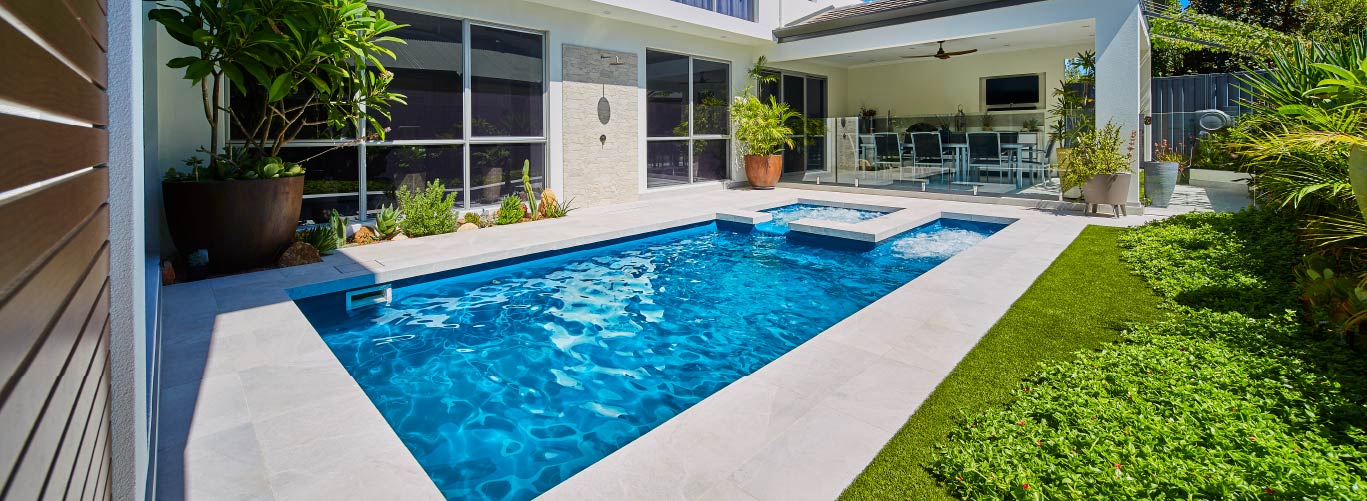
Maintenance Tips for Fibreglass Pools
Regular Cleaning
Although fibreglass pools require less maintenance than other types, regular cleaning is still essential to keep them in optimal condition. Use a pool vacuum or a robotic cleaner to remove debris from the water and surfaces. A soft brush can be used to clean the pool walls without damaging the fibreglass.
Chemical Balance
Maintaining the correct chemical balance is vital for the health of your pool and its users. Test the water regularly to ensure proper pH levels, chlorine, and alkalinity. Most pool supply stores offer testing kits, and some even provide professional testing services. Adjust chemicals as needed to prevent algae growth and keep the water safe.
Inspect and Repair
Periodically inspect your pool for any signs of damage, such as cracks or leaks. While fibreglass is durable, it’s still essential to address any issues promptly to prevent further damage. Consult with a pool professional for repairs to ensure they are done correctly and effectively.
The Future of Fibreglass Pools and Making the Right Choice
Fibreglass pools offer a range of benefits that make them an attractive option for homeowners seeking a stylish, durable, and low-maintenance swimming pool. With various designs to choose from, you can find the perfect pool to suit your lifestyle and enhance your outdoor space.
By understanding the different types of fibreglass pools and considering factors such as space, intended use, budget, and climate, you can make an informed decision that brings lasting joy and value to your home. Investing in a fibreglass pool is not just about creating a place to swim; it’s about transforming your backyard into a personal retreat where memories are made.
What Are The Different Fibreglass Pool Types?
As a homeowner, few things enhance your property more than a stylish and functional swimming pool. Among the various types available today, fibreglass pools are gaining popularity for their versatility, durability, and elegance. This blog post aims to guide you through the different types of fibreglass pools available, highlighting their unique benefits and how to choose the best one for your home. We'll explore various designs, factors to consider before making a decision, and essential maintenance tips. By the end of this read, you'll be well-equipped with the knowledge needed to make an informed choice that suits your lifestyle and enhances the charm of your backyard.
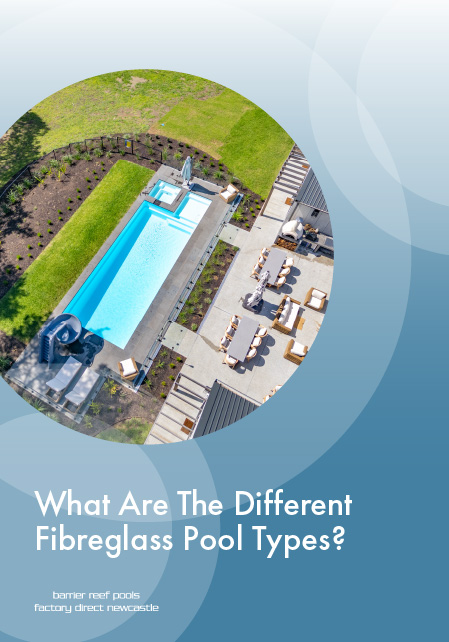
Benefits of Fibreglass Pools Over Traditional Pool Types
Durability and Longevity
One of the most significant advantages of fibreglass pools is their durability. Unlike concrete pools, which can crack over time due to ground movement, fibreglass pools are made from a flexible material that withstands such pressures. This resilience means fewer repairs and a longer lifespan, making them a cost-effective choice in the long run.
Quick Installation
Fibreglass pools come pre-manufactured, allowing for relatively quick installation compared to concrete pools, which need to be built on-site. What typically takes weeks or even months with traditional pools can often be completed in just a few days with fibreglass. This swift installation minimises disruption to your daily life and lets you enjoy your new pool sooner.
Low Maintenance
Maintaining a fibreglass pool is much more straightforward than other types. The smooth, non-porous surface of fibreglass inhibits algae growth, reducing the need for frequent cleaning and chemical treatments. As a result, you’ll spend less time maintaining your pool and more time enjoying it.
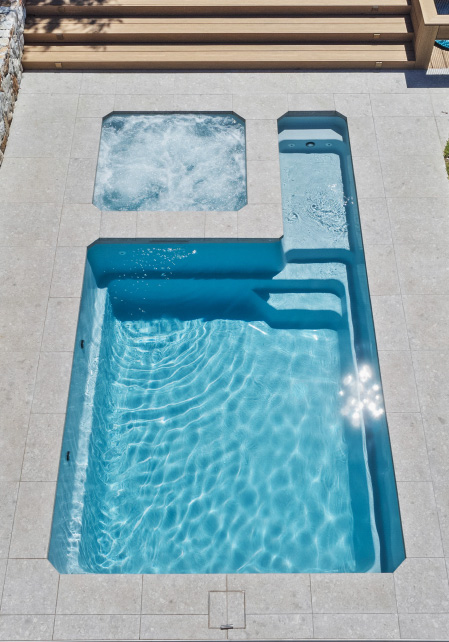
Overview of the Different Fibreglass Pool Designs
Rectangular Pools
Rectangular pools are a classic choice for those who prefer a traditional look. Their straight lines and clean edges make them ideal for swimming laps and hosting poolside gatherings. They also blend seamlessly with most landscape designs, offering a timeless appeal.
Freeform Pools
For a more natural aesthetic, freeform pools feature irregular shapes that mimic the appearance of a natural body of water. These pools are perfect for creating a backyard oasis, complete with rock formations, waterfalls, and lush landscaping. The organic shapes allow for creative freedom in design, providing a unique and customised look.
Plunge Pools
Plunge pools are compact and designed for relaxation rather than swimming laps. They are perfect for smaller backyards or as a complementary feature to a larger pool. Despite their size, plunge pools can be equipped with various features such as heating and jets, making them a luxurious retreat.
Lap Pools
Lap pools are long and narrow, specifically designed for exercise. They are ideal for fitness enthusiasts who want a pool for daily workouts. The streamlined design allows for efficient swimming, and they can be easily integrated into modern landscapes.
Pool and Spa Pools
A combination of a spa and a pool, pool and spa pools are smaller than traditional swimming pools but larger than typical spas. They offer the best of both worlds – a place to relax and unwind with the added benefit of a swimming area. Pool and spa pools are versatile and can be fitted with various features like jets, seating, and heating to enhance the experience.
Factors to Consider When Choosing a Fibreglass Pool
Space and Layout
Before selecting a pool, evaluate the available space in your backyard. Consider the layout and how the pool will fit into the existing landscape. Take measurements and consult with a pool expert to ensure the chosen design complements your outdoor area without overwhelming it.
Intended Use
Think about how you plan to use the pool. If you’re an avid swimmer, a lap pool might be the best option. For those who want a place to relax and entertain, a freeform or spool pool could be more appropriate. Understanding your needs helps narrow down the choices to those that align with your lifestyle.
Budget
Budget is a crucial factor when choosing a pool. While fibreglass pools are generally more affordable than concrete pools, prices can vary based on size, design, and additional features. Set a budget and discuss it with a pool contractor to find options that provide the best value without compromising on quality.
Climate and Environment
Consider the climate and environmental conditions in your area. For instance, if you live in a region with cold winters, you might want to invest in a heating system for your pool. Additionally, think about factors like sun exposure and potential debris from nearby trees, as these can impact maintenance needs.
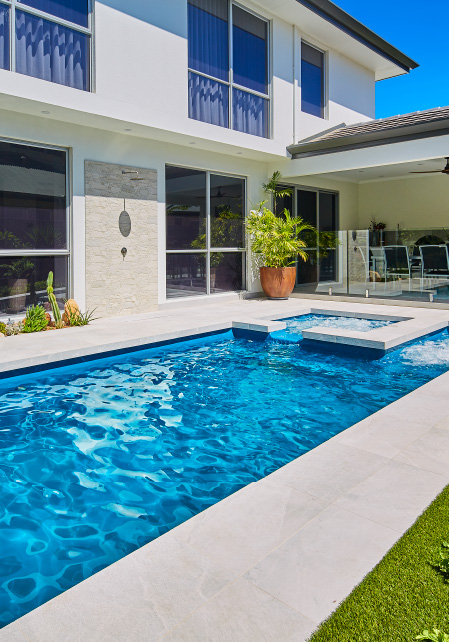
Maintenance Tips for Fibreglass Pools
Regular Cleaning
Although fibreglass pools require less maintenance than other types, regular cleaning is still essential to keep them in optimal condition. Use a pool vacuum or a robotic cleaner to remove debris from the water and surfaces. A soft brush can be used to clean the pool walls without damaging the fibreglass.
Chemical Balance
Maintaining the correct chemical balance is vital for the health of your pool and its users. Test the water regularly to ensure proper pH levels, chlorine, and alkalinity. Most pool supply stores offer testing kits, and some even provide professional testing services. Adjust chemicals as needed to prevent algae growth and keep the water safe.
Inspect and Repair
Periodically inspect your pool for any signs of damage, such as cracks or leaks. While fibreglass is durable, it’s still essential to address any issues promptly to prevent further damage. Consult with a pool professional for repairs to ensure they are done correctly and effectively.
The Future of Fibreglass Pools and Making the Right Choice
Fibreglass pools offer a range of benefits that make them an attractive option for homeowners seeking a stylish, durable, and low-maintenance swimming pool. With various designs to choose from, you can find the perfect pool to suit your lifestyle and enhance your outdoor space.
By understanding the different types of fibreglass pools and considering factors such as space, intended use, budget, and climate, you can make an informed decision that brings lasting joy and value to your home. Investing in a fibreglass pool is not just about creating a place to swim; it’s about transforming your backyard into a personal retreat where memories are made.



